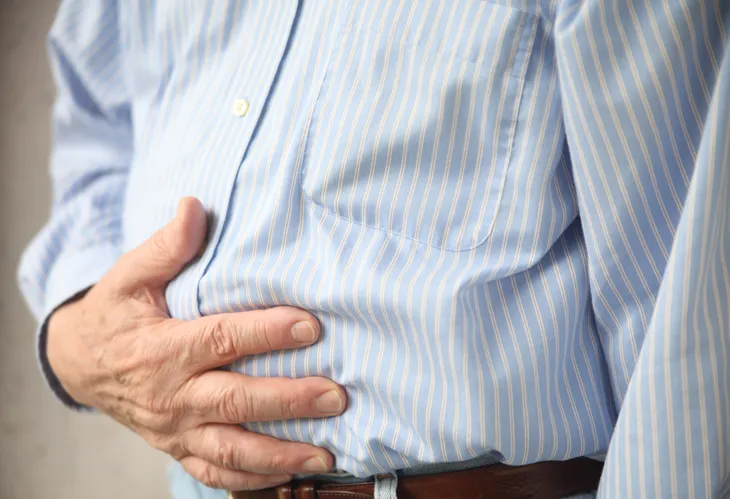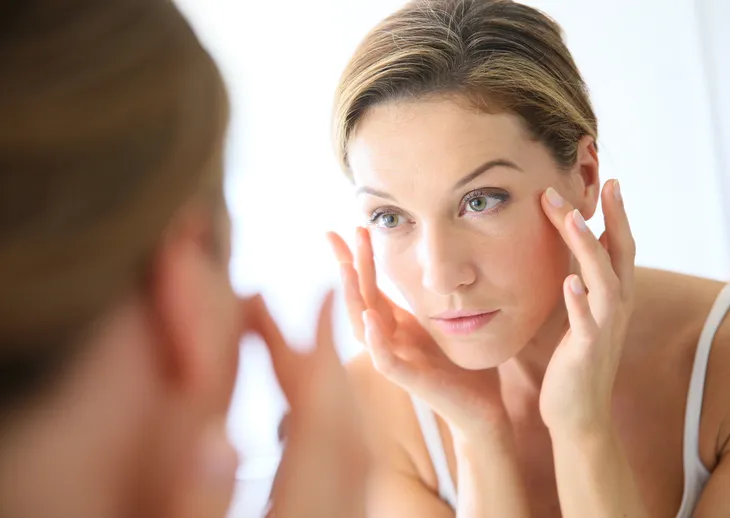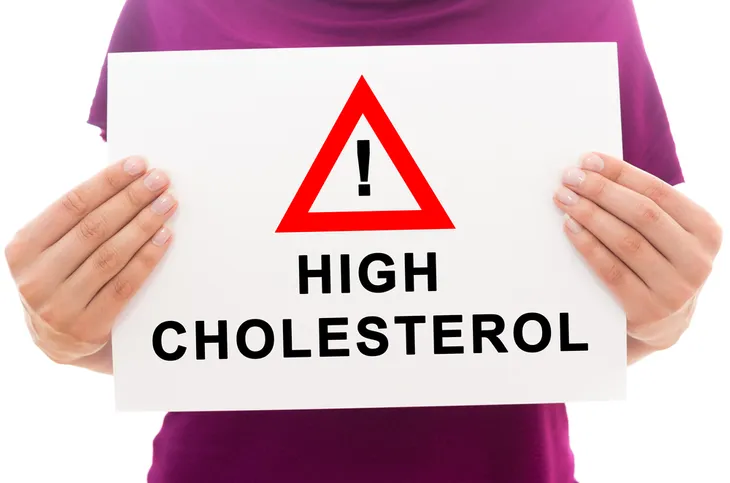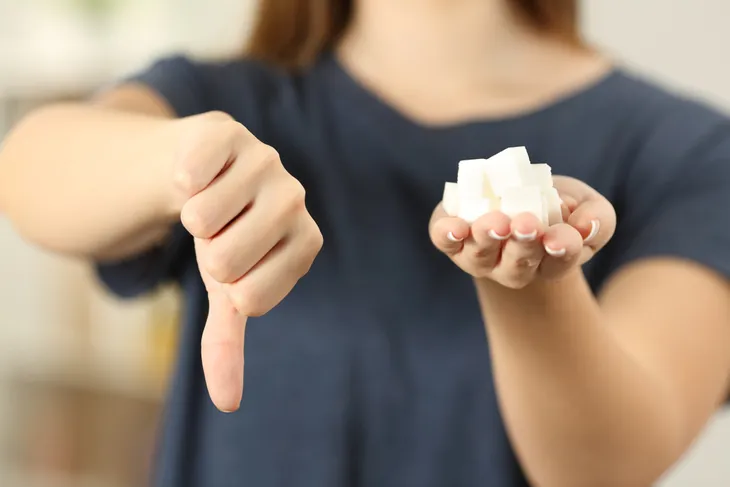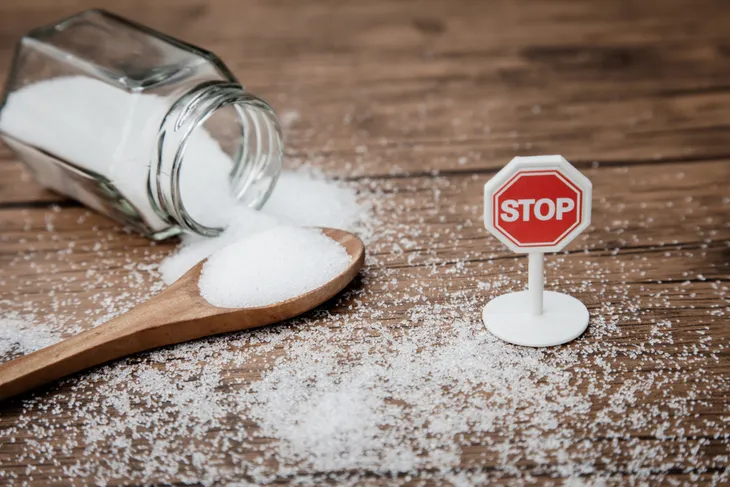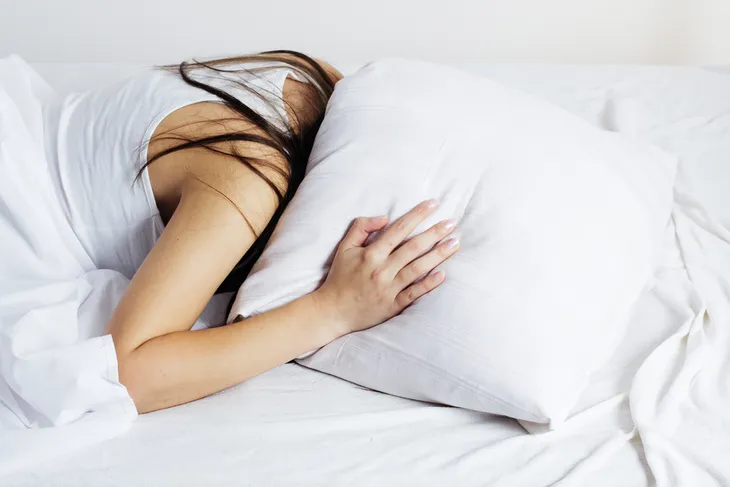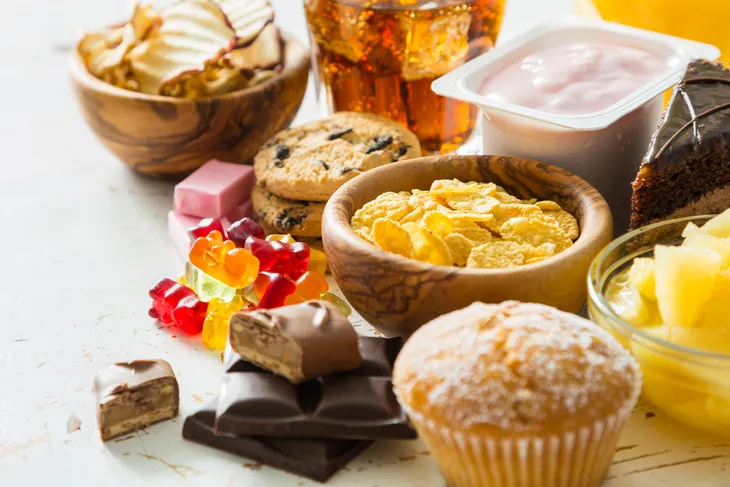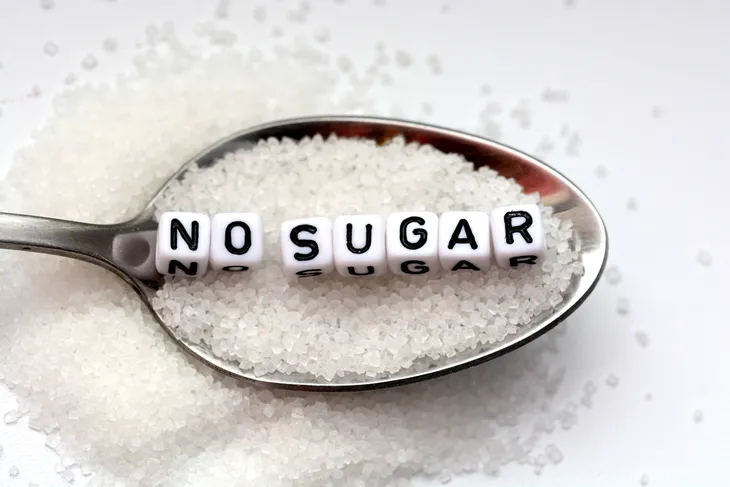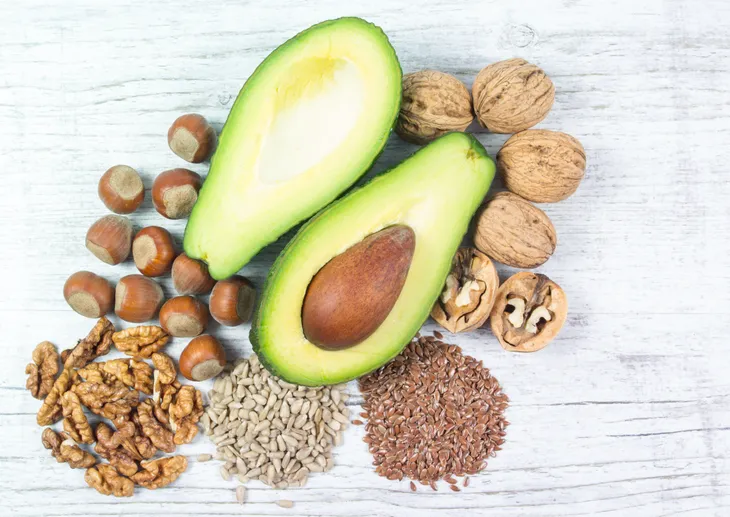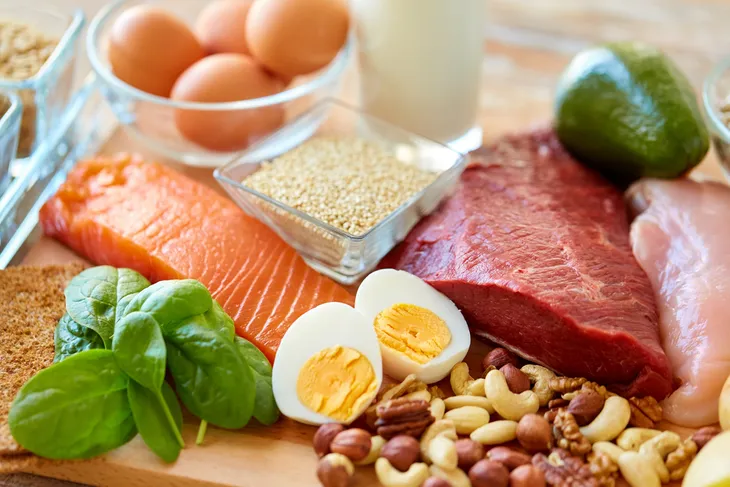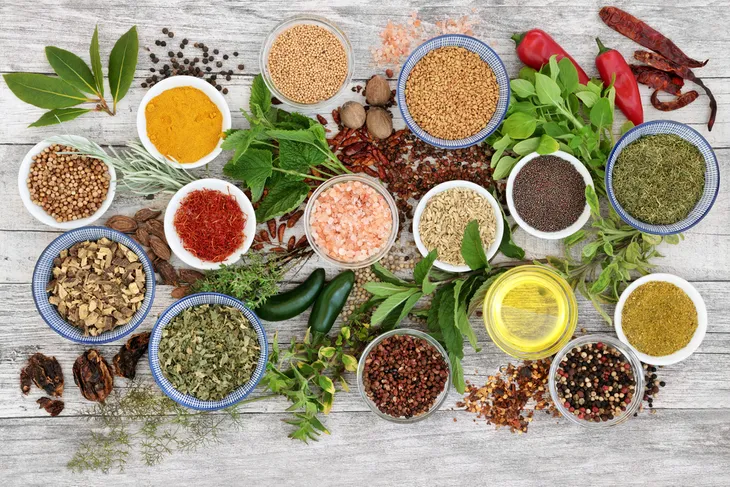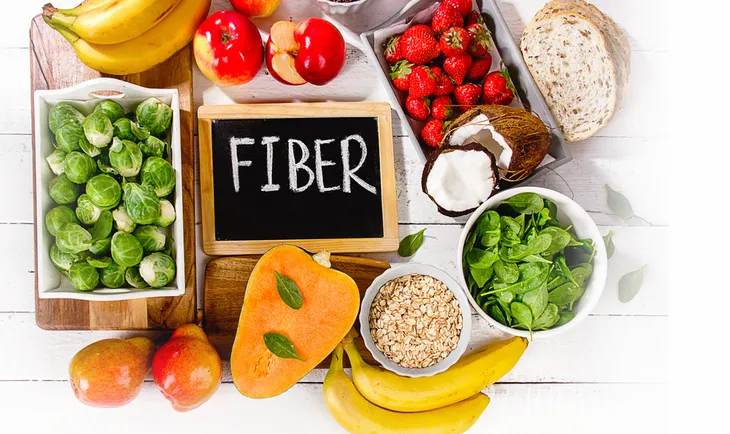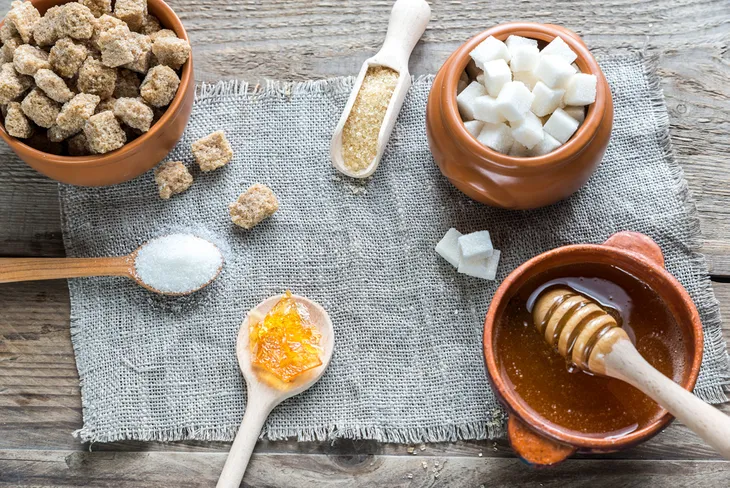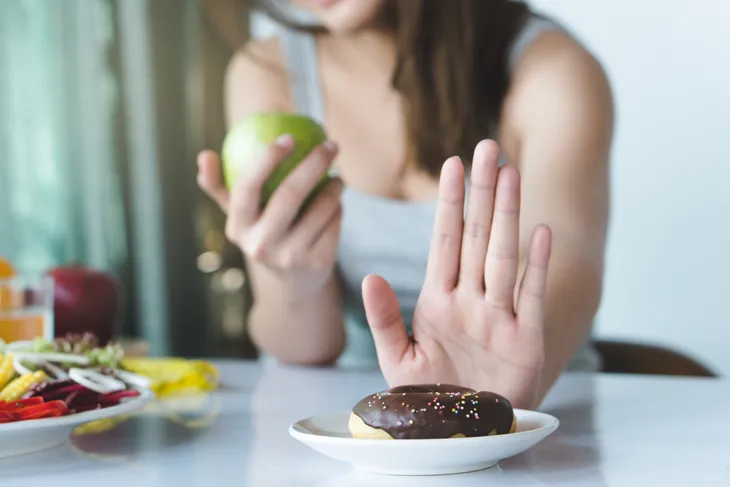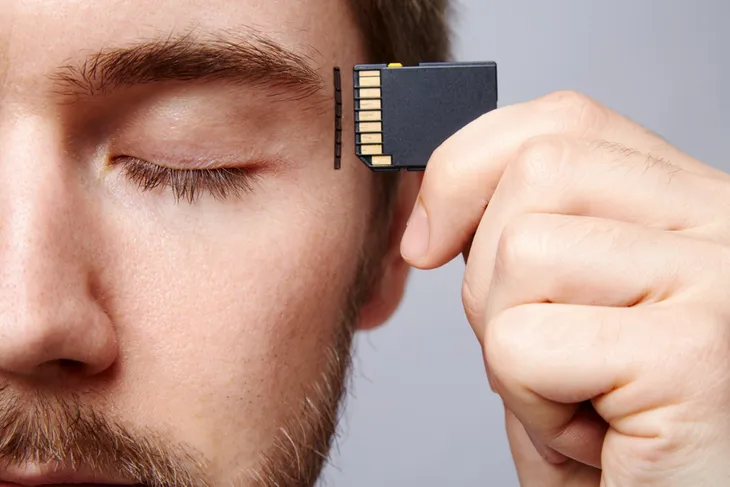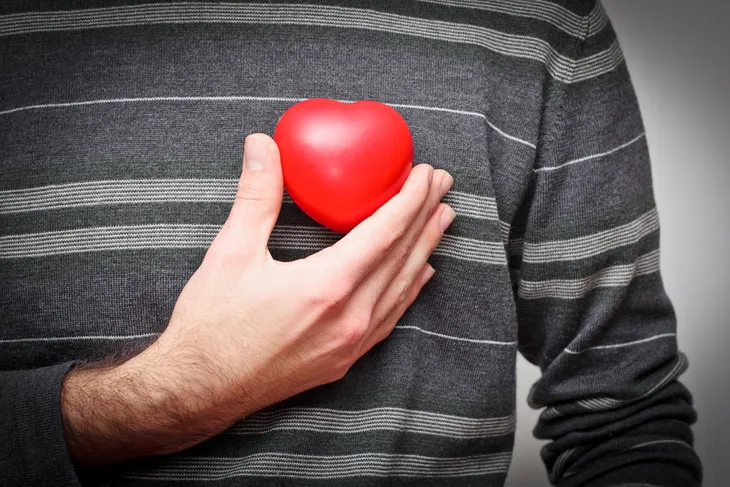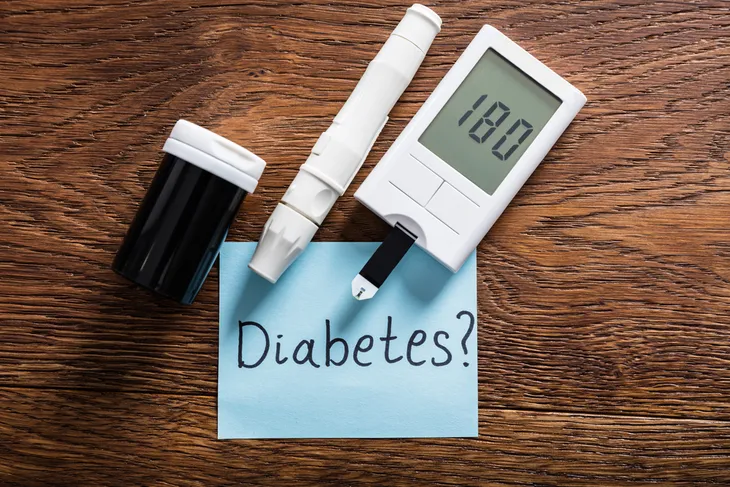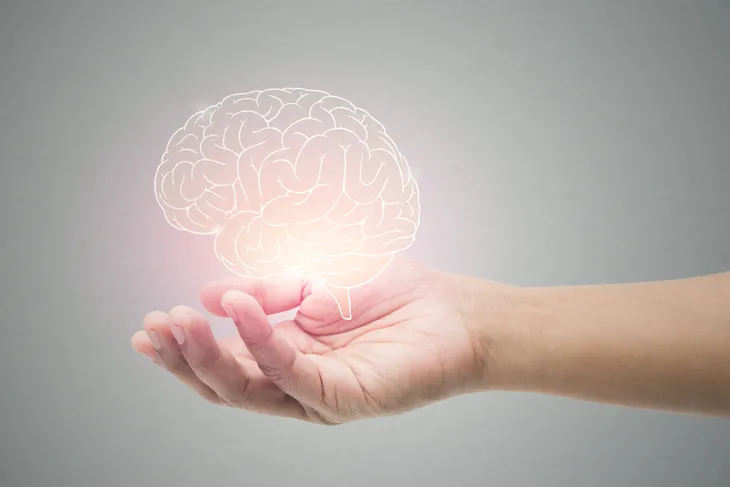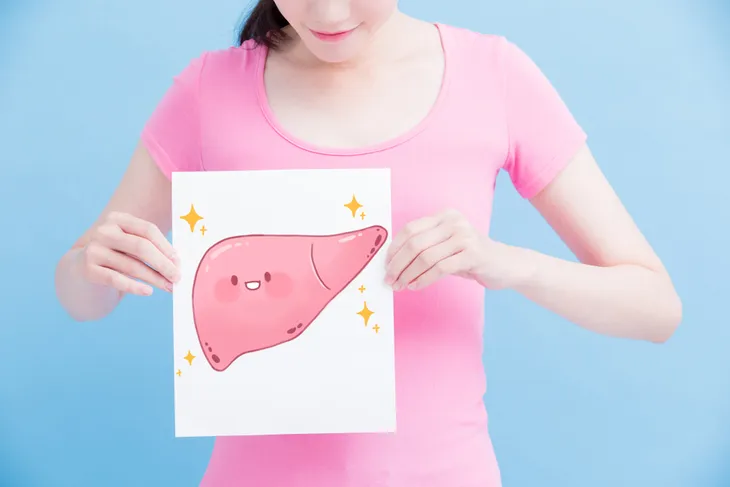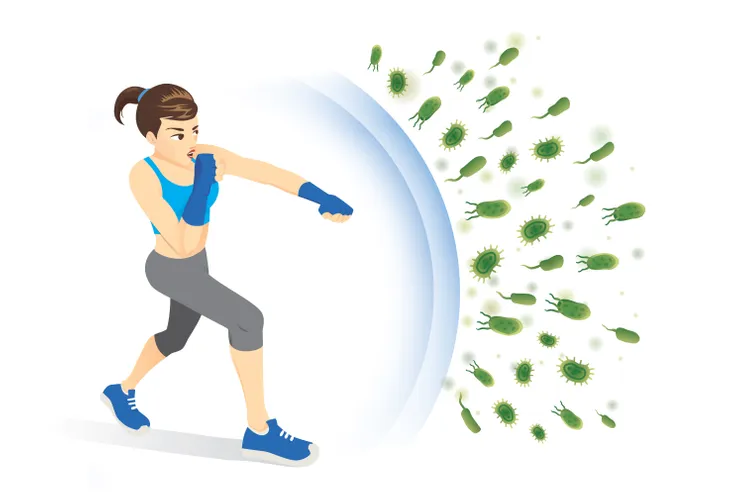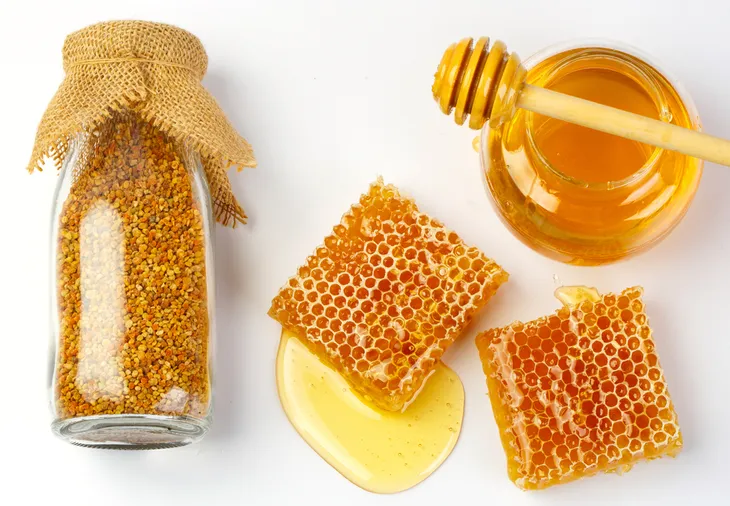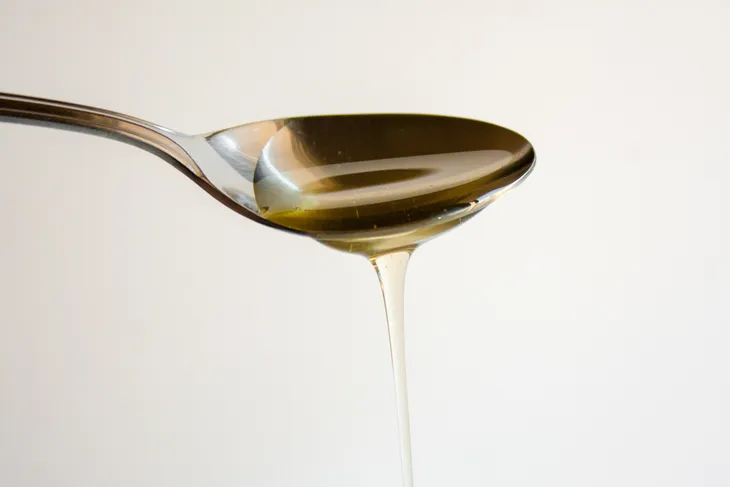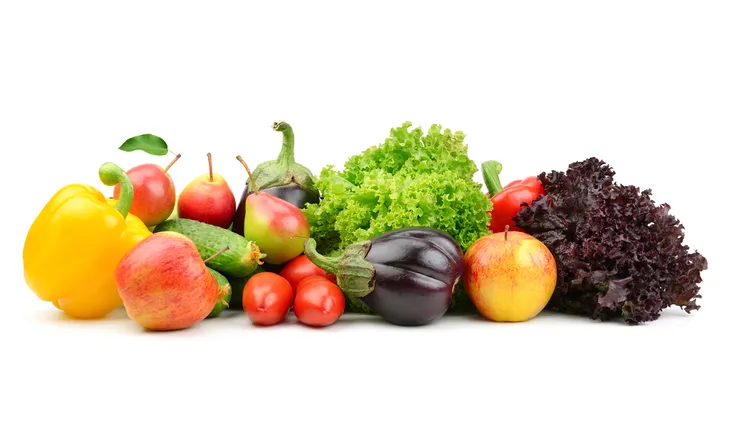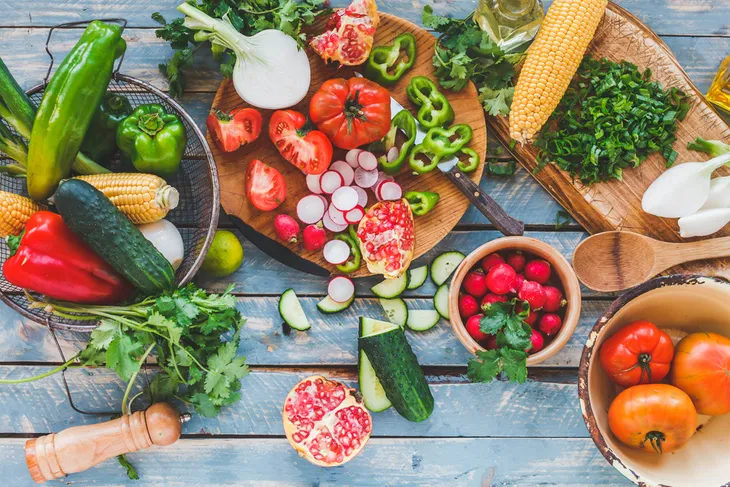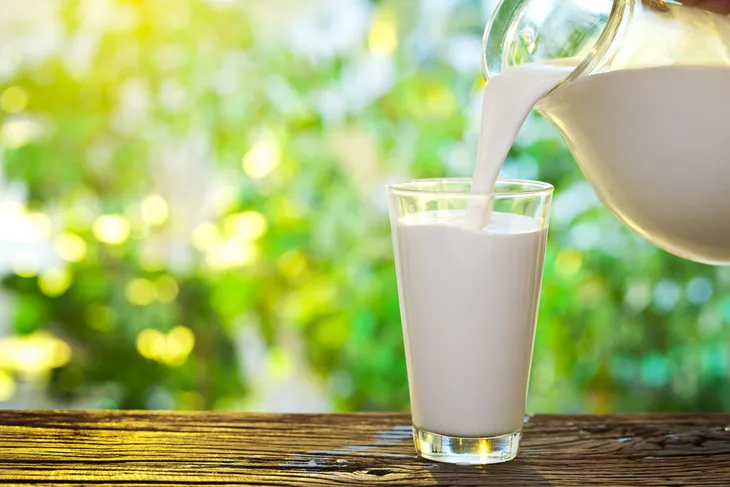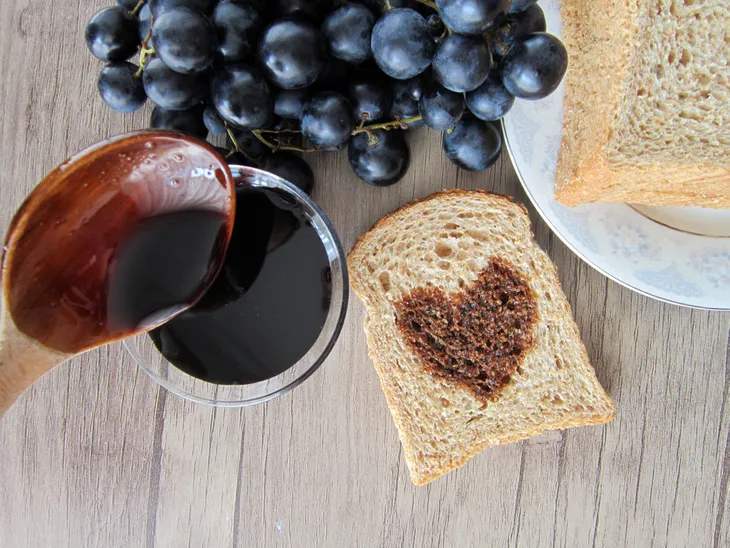Sugar is hard to resist – it lights up that pleasure center in your brain, which makes you want more. In fact, research has shown that the sugar you consume actually feeds Candida yeast and other unhealthy organisms hiding in your guts, which leads to more sugar cravings.
That means you can leave your inner ecology out of balance, which can lead to a host of health symptoms. Here’s a look at some of the warning signs that a person is eating too many sugary foods and the negative effects of it, as well as the symptoms of sugar withdrawal, how to cope, and some sweet alternatives to use instead of sugar.
Warning Signs
1. You Crave Sugar Constantly
“The more sugar that you binge on, the more you feed Candida overgrowth. The more Candida overgrowth you have, the more you crave sugar. It’s a vicious cycle,” explains BodyEcology.com.
The source explains that the “good” bacteria (that you want around) compete for space in the guts with Candida, which is a natural way your body keeps the balance in check. If you’re not consuming the right foods or have depleted good bacteria due to other factors such as antibiotic use, then you could be opening the door to unhealthy microorganisms, it adds.
2. Your Brain is Moving Slower
No, we don’t literally mean you’re unconscious, but as Self.com points out, eating high levels of sugar can leave you in a brain fog. Surprisingly, this actually is a result of having low blood sugar, not high blood sugar, says the source.
But wait… what? How can that be? Well, according to Self, consuming a lot of sugar makes your blood sugar levels spike, and then drop off quickly instead of gradually. “Poor blood sugar control is a major risk for cognitive issues and impairment,” it notes.
3. Your Body is Moving Slower
While too much sugar can put the brakes on your brain, it can also slow you down physically, says Self.com. The source says that while you might get a sugar “high” and a quick burst of energy after consuming something sugary, you’ll crash more quickly too.
Blood sugar spiking and dropping is not conducive to sustained energy throughout the day, it adds. “Energy is most stable when blood sugar is stable,” it notes. Because your diet is full of sugar, it might also mean you’re not getting enough protein and other essentials, which can also explain your feeling of sluggishness throughout the day, it adds.
4. Your Skin is Breaking Out
Healthline.com explains that there is actually a link to acne from consuming refined carbohydrates, a category that includes sugary food and beverages. Sugary foods make your blood sugar levels rise, which leads to a higher level of a steroid called androgen along with inflammation that “play a role in acne development,” it says.
It points to studies that say low-glycemic diets are associated with lower risk of acne breakouts – it cites one study in particular that found teens who regularly consume sugar have a 30-percent higher chance of developing acne (among 2,300-test subjects).
5. The Scale Doesn’t Tip in Your Favor
There’s a direct connection between consuming high levels of sugar and weight gain, says WebMD. “This probably isn’t news to you, but the more sugar you eat, the more you’ll weigh,” it explains.
It cites research that says people who drink sugary drinks in particular are prone to weight gain, as well as be at higher risk for type-2 diabetes. How much weight are we talking? Well, the source points to one study that shows subjects that increased sugar intake gained approximately 1.7-pounds in less than two months. At that rate, you’d gain more than 10-pounds a year.
6. There’s Nothing to Smile About
Hope you like going to the dentist – because it likely means you’ll be making trips to fill cavities if you’re filling your sugar craving all the time, says WebMD. “You probably rolled your eyes at age 12, but your mother was right: Candy can rot your teeth,” it says.
That’s because lingering sugar in your mouth – it can be hard to reach with a brush sometimes – attracts bacteria that eat the sugar and leads to cavities, says the source. There’s nothing sweet about that, unless your dentist is a fun person to hang out with in the treatment chair.
7. Sugar Highs Lead to Low Moods
As Healthline.com points out, a diet that’s high in added sugar (as well as processed foods) can actually up your risk of developing depression. It says researchers believe “blood sugar swings, neurotransmitter dysregulation and inflammation” associated with sugar intake can all negatively impact your mood.
It cites a study that follows 8,000-people for 22-years, which shows men who consumed 67-grams or more of sugar per day are 23-percent more likely to show symptoms of depression than those who ate 40-grams or less. A study sugar consumption among women had similar results, it adds.
8. The Pressure Is On
You might not know about this health sign of sugar intake until you visit the doctor for a checkup, but Best Health magazine says high blood pressure can be a sign of high sugar intake.
The source notes a high-sugar diet can push your blood pressure beyond what it considered normal range, and it even says that some scientists argue that limiting sugar may be more important than lowering sodium intake when it comes to blood pressure regulation. Fructose (also known as fruit sugar) in particular “may uniquely increase cardiovascular risk by inciting metabolic dysfunction,” it adds.
9. You Feel Bloated For Apparently No Reason
Feeling bloated is not fun physically, and it doesn’t make you feel good mentally either, but it’s apparently a side effect of too much sugar, says Bustle.com.
This is because sugar intake can lead to a wonky metabolism and more retained fluids, making your abdomen feel puffed out, says the source. If you feel bloated often, recount what you’ve been eating – if it’s full of sugar, you might have your answer, it suggests.
10. You Have Fewer Sweet Dreams
If you find yourself tossing and turning in your sleep, it could be the result of eating too much sugar during your waking hours (especially close to bedtime), says Bustle.
This over-consumption of sugar can be “throwing off your body’s balance of hormones,” and that could be keeping you staring at the ceiling at 3 a.m. If you’re going to down a sweet treat, try to do it a few hours before you plan to get some shut-eye. Instead of cookies or cake, you could also try eating yogurt or a few slices of cheese to curb those late-night cravings.
11. Speeding Up The Clock
WebMD claims that eating too much sugar can actually speed up the appearance of aging on your skin. It says that sugar attaches itself to proteins in your blood and creates “harmful molecules” called advanced glycation end products, or AGEs.
“These molecules do exactly what they sound like they do: age your skin,” notes the source. This occurs due to damage to the protein fibers that keep your skin looking youthful, namely collagen and elastin, it adds. Sugar intake can actually encourage sagging of the skin, so remember that the next time you’re ramming a donut down your throat.
12. Workouts Are No Longer Working Out
If you’re the active type, good for you. But eating right is still very important, and if you eat mostly sugary stuff, you’ll find yourself crashing following a workout, says Best Health mag. “If exercise seems to be getting harder, a high-sugar diet might be to blame,” it notes.
That means if you down some treats before engaging in intense activity, you might feel more fatigued than usual when you’re done, it adds. You might not even be able to make it through your regular jogging route, due to the rapid drop in blood sugar after a spike, it adds.
13. Raising Risk of Higher Cholesterol
This is another symptom of high sugar intake that you might not be aware of until your doctor draws blood and takes a better look. Sugar can increase levels of some fats in your bloodstream, decreasing your levels of healthy cholesterol at the same time, it adds.
The source admits the link between sugar, cholesterol and blood fats is not yet fully understood, but says research cited in the Journal of the American Medical Association suggests it could be fructose that promotes the creation of “bad” cholesterol. Your doctor or dietician will be able to help steer you away from foods to maintain healthy cholesterol levels.
Side Effects
14. Causes Cravings and Addiction
Sugar addiction is a real and growing concern for a large majority of the world’s population. But how exactly does this happen? The Huffington Post explains that when a person consumes sugar, the tongue’s taste buds become activated and send signals to the brain, “lighting up reward pathways and causing a surge of feel-good hormones, like dopamine, to be released.”
And while the source says stimulating these reward pathways with sugary treats is okay from time to time, over-activating them can lead to more serious concerns such as “loss of control, craving, and increased tolerance to sugar.”
15. Impairs Memory and Learning Skills
According to Forbes, people who consume too much fructose— otherwise known as added sugar—produce less of the chemical brain-derived neurotrophic factor (BDNF). As BDNF assists the brain with learning and the formation of new memories, without a sufficient amount of it the source says “we can’t learn (or remember) much of anything.”
Additionally, research out of UCLA found that a high-fructose diet actually slows the brain down. In the study, it was found that rats that consumed too much fructose “had damaged synaptic activity in the brain, meaning that communication among brain cells was impaired.”
16. Contributes to Depression
Consuming too much added sugar can also have major impacts on your mood and mental health. One example of this is what’s commonly referred to as a ‘sugar crash,’ where the body’s blood sugar spikes upon consumption of a sugar-rich snack or beverage, and then plummets soon after, leaving you “feeling anxious, moody or depressed,” says The Huffington Post.
The source adds that, in addition to a sugar crash, over-consumption of fructose can “mess with the neurotransmitters that help keep our moods stable.” One such neurotransmitter is called serotonin, which boosts our mood after eating sugar. Unfortunately, the body only has a limited amount of it to offer, and the more frequently it’s released the faster the body’s supply is depleted, leading to symptoms of depression.
17. Linked to Dementia and Alzheimer’s Disease
As mentioned earlier, overconsumption of sugar causes the body to produce less BDNF, which, among other things, helps with memory formation. So it’s probably not surprising to learn that it’s linked to dementia and related conditions.
In fact, Forbes says “It’s possible that low BDNF may turn out to be the smoking gun in these and other diseases, like Alzheimer’s.” Although more research about this connection is still being conducted, the source says that “what seems clear in any case is that a reduced level of BDNF is bad news for our brains, and chronic sugar consumption is one of the worst inhibitory culprits.”
18. Inhibits ‘Overeating’ Sensor From Working
It’s common knowledge that overconsumption of sugar can lead to weight gain, and in severe cases obesity, but researchers are now coming to understand exactly why. According to Forbes, it’s recently been discovered that “chronic consumption numbs the brain’s anorexigenic oxytocin system, the sensor that prevents overeating.”
And with this crucial sensor disabled—on an almost-permanent basis in some individuals—“our brain doesn’t release hormones to signal that we’re full,” resulting in excessive overeating, thus perpetuating the problem even further.
Sugar Withdrawal
Sugar is so prominent in our diet, we’ve become somewhat dependent on it or rather, “addicted” to it. Ever heard of sugar cravings? Because of this, when we stop eating sugar, our body goes through some alarming changes, both mentally and physically. Don’t worry, they don’t last forever.
Here’s a look at some of the symptoms of sugar withdrawal and a few tips on how to cope with them until it passes…
19. Physical Symptoms
Before we dive into the mental withdrawal symptoms, we’ll talk about the physical ones first. Headaches is one of the first symptoms to appear and the most common side effect of a sugar detox. However, it’s not the only one. In addition to the body feeling generally and overall just “worn down,” Healthline points out that a person will also experience light-headedness, dizziness, nausea, tingling, and fatigue.
While these symptoms sound pretty awful and quite frankly, a little scary! Don’t worry, it does get better. The length of how long it takes to feel “better” depends on how much sugar you were consuming before the detox, but according to the Cleveland Clinic, a person can break their sugar addiction is only 10 days.
20. Depression
Now onto the mental symptoms of sugar withdrawal. Feeling down and lousy is a common side effect of a sugar detox. “Along with low mood, you may also notice a lack of enjoyment in things you once found pleasurable,” says Healthline.
21. Anxiety
Similar to depression and feeling down and out, you will most likely experience some anxiety. “Feelings of anxiousness may also be accompanied by nervousness, restlessness, and irritability,” writes Healthline. “You may feel like you have less patience than usual and are on edge.”
The source goes on to explain that a good way to cope with this anxiousness is to do things that help manage your stress. Take time to decompress and invest in some self-care throughout the day by taking a walk, talking to a friend, or just reading a book.
22. Sleep Problems
Another symptom that you can probably expect to happen is that you’ll experience some changes in sleep patterns. “Some people experience changes in their sleep when detoxing from sugar. You might find it hard to fall asleep or stay asleep through the night,” explains Healthline.
Unfortunately, sleep problems can be a vicious cycle because not getting enough sleep can actually make symptoms like fatigue, cravings, and depression, worse! It’s also been shown to increase cravings for unhealthy comfort foods. When we get enough sleep we not only function better, but we make better choices. This includes food and diet choices.
23. Difficulty Concentrating
This could be a result of some of the other symptoms on this list, but overall, people who cut sugar out of their diet will experience some cognitive issues in the first week or so. Healthline writes, “You may find it difficult to concentrate when you quit sugar. This can cause you to forget things and make it hard to focus on tasks, such as work or school.”
24. Sugar Cravings
This one is pretty scary and seems far-fetched, but it’s actually been proven through scientific research. Studies have found that sugar affects the brain in the same way that addictive substances do. To make matter worse, most of us are consuming way too much sugar on a daily basis which makes it hard to quit. We’re supposed to only have a maximum of 6-teaspoons of sugar a day, but Healthline points out that the average American is consuming around 22 to 30-teaspoons. No wonder the withdrawal symptoms are so drastic!
So how do these cravings work? Healthline explains that even though the idea of sugar being addictive is still somewhat debated among experts, studies have shown that “sugar triggers the release of dopamine in the nucleus accumbens — the same area of the brain implicated in response to heroin and cocaine.” When we eat sugar, our brain releases endogenous opioids, leading to a rush similar to what is experienced when someone injects heroin. As a result, we’re caught in a vicious cycle of constantly wanting more. When the supply is cut, our body goes into withdrawal.
How to Cope
25. Go Cold Turkey
You might be thinking that gradually easing off sugar will lessen the withdrawal symptoms and make it easier — wrong. Quitting cold turkey is the best method. “I’ve always found that going cold turkey is the best way to cut sugar,” says Brooke Alpert, RD, nutritionist and author of The Sugar Detox to Health.com. “Telling a true sugar addict to slowly reduce the amount of sugar they eat each day is like telling an alcoholic to drink less.”
If you quit cold turkey, you’re more likely to stick to the rules and not allow yourself to slip up here and there. These “slip ups” every now and again will only become more frequent and put a person at risk for abandoning the diet altogether. Another related tip that will help with the quitting cold turkey method is to go off sugar completely for three full days. When we say completely we mean even natural sugars from fruits and vegetables. Of course this isn’t for the long run it’s just to help kickstart the process in the beginning.
26. Eat Foods with Healthy Fats
People sometimes get scared of the word “fat,” and we totally understand that! However, there is such thing as heart-healthy fats. These are a great thing to eat when dealing with sugar withdrawal symptoms because similar to fiber and protein, they will help keep you full and ward off those naggy sugar cravings. Dr. Axe explains that fat is digested slowly which is how it keeps us full for longer. To be clear, we do not recommend running out and eating greasy foods like burgers and fries. When we talk about healthy fats we mean things like avocados, nuts, seeds, and coconut oil.
Health.com points out that once a person stops eating sugar their body begins to act out in other ways like by messing with mood and energy levels. To combat this, eat more healthy fats. Alpert tells the source that eating healthy nourishing foods can help re-stabilize those mood and energy levels back to normal. “Keep yourself satisfied, especially with foods that are high in healthy fat,” she says.
27. Stay Hydrated
Drinking lots of water and staying hydrated is always important, but when you’ve decided to give up sugar and the body is experiencing sugar withdrawal, water is your ally! According to Women’s Health, when someone gives up either sugar, wheat, or dairy, it has a diuretic effect which means any weight loss in the first week is likely from water and excess inflammation.
Dr. Axe also points out that people often confuse being thirsty with being hungry. Probably because eating is a lot more satisfying than just drinking some water! If you feel like you’re struggling with cravings, try drinking some water. Nutritionist Brooke Alpert, RD, backs this claim up by stating that cold drinks can help curb sugar cravings. “It just kind of chills the mouth in a way.”
Water also has the ability to combat some of the symptoms of sugar withdrawal like headaches and fatigue, says Health.com.
28. Eat More Protein
Protein is a great food to eat because it keeps us full for longer periods of time. This is really important when a person cut their supply of sugar which is what gave them those bursts of energy throughout the day that always end up in a crash. The protein from vegetables is a much more sustainable way to stay fuelled throughout the day.
“Not only does a high-protein diet cut levels of ghrelin, the hunger hormone, but it also helps maintain normal blood sugar levels to prevent several sugar withdrawal symptoms,” writes Dr. Axe. The source advises eating things like grass-fed beef, lentils, wild fish, black beans, organic chicken and eggs.
29. Exercise
Not only is exercise a great way to keep your mind off the withdrawal symptoms, it also creates endorphins that can help ease the symptoms. It also provides energy which is something you’ll need during a sugar detox because one of the symptoms of sugar withdrawal is fatigue. It also helps combat stress.
Healthline cites a 2015 study that found “short bouts of exercise, such as a brisk 15-minute walk, reduced cravings for sugary foods.”
30. Use Herbs and Spices to Season
One of the biggest things people struggle with when cutting out sugar is that they feel like all foods without sugar are “bland.” Plus, they’re craving sugar so anything that isn’t sugar won’t taste as good. Health.com advises combating this by using herbs and spices to add flavor. “Using lots of herbs and spices, as well as ingredients like onion, garlic, and lime, will help you withdraw from sugar without feeling like your food tastes terrible,” says nutritionist Brooke Alpert, RD, to Health.com.
31. Eat Something Bitter
This one might sound strange, but eating bitter food can help cub those addictive sugar cravings. “Eating bitter foods shuts down the receptors in the brain that drive us to wanting and eating sugar, according to research,” says Healthline. “Bitter food also slows the absorption of sugar and helps regulate blood sugar levels, which can help you avoid many of the side effects of sugar detox.”
32. Eat More Dietary Fiber
Similar to protein and healthy fats, fiber helps keep us full for longer periods of time which is key when someone is struggling with sugar cravings. “Not only that, but dietary fiber also helps keep blood sugar levels steady, preventing a drop in sugar levels and side-stepping some potential negative effects of sugar withdrawal,” writes Dr. Axe.
The source then goes on to give some good examples of high-fiber foods to eat like vegetables, nuts, seeds, and legumes. Also, Dr. Axe points out that eating too much fiber can cause constipation, so just remember to balance this out by drinking lots of water at the same time.
33. Enjoy Natural Sugars
Cutting sugar out of your diet doesn’t mean that you have to give up all sweet things! The sugar that needs to be cut out for a sugar-free diet is only the bad sugar like that kind that’s found in desserts and candy, as well as added sugars. There are plenty of other ways to enjoy a little something sweet. You can still eat natural sugar which is found in fruit, raw honey, dates, coconut sugar, maple syrup, as well as artificial sweetener like stevia. When buying artificial sweetener, just make sure it’s the least processed kind. Dr. Axe suggests choosing green leaf stevia.
Benefits of Quitting Sugar
Since sugar is so prevalent and has such a profound effect on our body, when we stop eating it there are many things that happen to our body. At first it will be difficult as the body goes through some mild withdrawal symptoms. But after that, there are several amazing health benefits that occur when a person cuts sugar from their diet. Here’s at look at 14 of them…
34. Reduced Food Cravings
You’ve probably heard before that sugar is addictive, hence why it can be so hard to cut it out of our diet and why our body tends to have a negative response to the withdrawal at first. Sugar is designed to cause our body to want more and crave it. When we eat a lot of sugar it sends our blood sugar levels on a roller coaster of ups and downs making it hard to manage. “The lows drive you to drastically increase your blood glucose and, as a result you’re more likely to crave higher sugar foods which keeps you riding the sugar roller-coaster,” says nutritionist Jenna Hope to Cosmopolitan. It’s not uncommon for the body to crave these highs and lows. Quitting sugar altogether means getting off the sugar roller-coaster and reducing those unhealthy food cravings. (To learn how to combat these cravings, checkout this article on Sweet Tips for Beating Sugar Cravings).
35. Your Memory Will Get Better
You probably are more likely to blame feeling foggy and sluggish on a lack of sleep, but in reality, it’s sugar that might be to blame. According to an animal study done by UCLA, a diet high in sugar can affect memory and learning. “Overtime, eating lots of sugar may actually damage communication among your brain’s cells, the study shows,” writes Prevention. If you find that you’re having trouble thinking clearly or being on top of your game mentally, try skipping the sugar.
36. Lower Risk of Heart Problems
Eating foods that are good for our heart is super important…for obvious reasons. Unfortunately, sugar is not one of them. In fact, Health.com cites research that shows sugar can have a hugely negative impact on our cardiovascular system. A study published in 2014 found that people who consumed anyways from 17-percent to 21-percent of their daily calories from sugar were at a 33-percent higher risk of dying from heart disease than those who didn’t consume that much sugar. To ensure a long, happy and healthy life, start cutting back on sugar.
“Added sugar chronically raises [hormone that regulates glucose in the blood] levels, which activates the sympathetic nervous system, increasing blood pressure and heart rate,” says James J. DiNicolantonion, PharmD, a cardiovascular research scientist at St. Luke’s Mid-Atlantic Heart Institute in Kansas City, MO to Prevention. “Within a few weeks’ time, you might expect to see a 10-percent decrease in LDL cholesterol and a 20 to 30-percent decrease in triglycerides.”
37. Your Skin Will Clear Up
One of the most obvious physical signs of cutting sugar from your diet is that your skin will clear up! Good riddance to all that acne! The reason sugar causes acne is because sugar is an inflammatory food and Prevention points out that acne is a result of systemic inflammation. A study published in the American Journal of Clinical Nutrition found that “when non-soda-drinkers consumed one 12-ounce can a day for 3-weeks, their inflammation levels increased by 87-percent,” writes the source.
In addition to clearing up any acne, eating less sugar is also a great way to prevent wrinkles and aging skin.Collagen and elastin are two important proteins that are responsible for keeping the skin looking young, but sugar works to destroy these proteins. “Sugar causes glycation, a process by which the sugar molecules bind to an deform the collagen and elastin in our skin,” says Anthony Youn, MD, a plastic surgeon in Troy, Michigan, and author of The Age Fix: A Leading Plastic Surgeon Reveals How To Really Look Ten Years Younger to Reader’s Digest.
All it takes is 14 days without sugar and your skin will start glowing. “Giving up (or reducing) the amount of sugar you eat can also reduce glucose and [the hormone that regulates glucose] in your bloodstream, reducing chronic and acute inflammation linked to aging,” says Dr. Youn to the source.
38. You’ll Finally Lose the Weight
According to the Harvard School of Public Health in Boston, the average person eats around 22-teaspoons of added sugars a day. This amounts to about 350 calories! Reader’s Digest talked to Leah Kaufman, MS, registered dietitian at NYU Langone’s Weight Management Program who explained how sugar can be addicting, but if we stop eating it, it can help a person lose weight. “Sugar can be addicting, and when we decrease the amount that we eat, it also stops cravings, so we consume fewer calories and lose weight,” says Kaufman. It seems like this is that magic diet plan we’ve all be waiting for!
Not only is it addicting, but endocrinologist David Ludwig, MD, a professor of nutrition at the Harvard T.H. Chan School of Public Health, and coauthor of Always Delicious, told Health.com that sugar causes high levels of insulin which “puts fat cells all over your body into calorie-storage overdrive.” He describes it as Miracle-Grow for fat cells. “It’s just not the sort of miracle you want happening in your body.”
Even more so, sugar doesn’t work like other more nutritious whole foods by telling the body when it’s full. “When you eat refined sugar, your body may not get the signal that you’re full, causing you to consume too many calories and gain weight,” adds Megan Gilmore, a certified nutritionist consultant in Kansas City, Kansas, and author of No Excuses Detox: 100 Recipes to Help You Eat Healthy Every Day to Reader’s Digest. “When you replace sugar with nourishing whole foods, your hormones will naturally regulate, sending signals to the brain when you’ve eaten enough.”
39. No More Mood Swings
This one might not seem like it’s coming for a while after quitting sugar because at first, cutting sugar has the opposite effect of this! One of the first symptoms of sugar withdrawal is moodiness, but once you’ve fully kicked the bad habit, you’ll notice that your mood is much more regulated. You’ll begin to feel better than ever.
We will get into this more later on in the article, but one of the reasons these mood swings will disappear is because sugar has been linked to depression and sadness. “Sugar has been shown to suppress a hormone called BDNF which is required to produce new neurons. Individuals who are susceptible to low mood have lower BDNF, and so the suppression of this from sugar may further enhance low mood and depression,” says nutritionist Jenna Hope to Cosmopolitan. For these people especially, cutting out sugar will help return their mood to normal.
Prevention cites a study done by Columbia University which found that women “who eat a diet high in added sugars and refined grains are more likely to experience anxiety, irritability, and mood swings.”
40. You’ll Sleep Will Improve
Do you find it difficult to fall asleep and stay asleep? If you’re tossing and turning all night long, it might be because you’re eating too much sugar. Those crashing lows from sugar can leave a person feeling sluggish during the day and in need of a nap. Prevention also points out that added sugars trigger a release of the hormone cortisol, and that interferes with sleep.
A diet full of sugar can also affect how the brain releases melatonin, the hormone that regulates sleep-wake cycles. “A high sugar intake will delay the release of melatonin in the brain, which is essential for the homeostatic control of sleep,” says nutritionist Jenna Hope to Cosmopolitan. “Research suggests that poor sleep may lead to an impaired blood glucose balance which stimulates your desire to consume more sugar.”
41. Lower Risk of Diabetes
Sugar is notorious for causing harmful spikes in blood sugar, obesity and thus, linked to diabetes. If cutting sugar helps a person shed weight (as we previously mentioned), this means cutting sugar in your diet can also help lower the risk of diabetes. But sugar is tied to diabetes in another way other than weight gain. Health.com explains that a diet with lots of fast-digesting carbohydrates like sugar, can affect how much the pancreas releases the hormone that regulates glucose in the blood. An excessive demand on the pancreas can cause the hormone-producing cells to malfunction and eventually lead to diabetes, says David Ludwig, MD, to Health.com.
According to March Alabanza, a Certified Nutritional Counselor and program director of GroundSea Fitness, a detox retreat in the Berkshires of Massachusetts, once a person cuts out sugar, the changes will begin immediately. “In the first couple of hours without sugar, your pancreas will start to produce less [hormone that regulates glucose in the blood] and your liver will also start to catch up on processing stored toxins,” he says to Reader’s Digest.
Alabanza also explains that when it comes to diabetes, the symptoms can take up to five weeks to subside and the process can take longer if you’re already in a pre-diabetes state. A prediabetes state is when your body still produces the hormone that regulates glucose, but it doesn’t use it properly. “The time for most of these symptoms to completely subside can run up to five weeks, at which point one will no longer be a slave to refined sugar.”
42. Increase Energy
If we get into a mindset that food is fuel for the body then it might change what foods we eat. Foods that are empty in calories and nutritional value aren’t going to fuel the body very far and this is exactly what sugar is — empty calories. Health.com also explains that added sugars are simple carbohydrates which means they are digested fast and go into the bloodstream quickly, so while they the sugar will spike your blood sugar levels, it’s also going to cause a crash. Eating foods that are high in sugar all day is going to create this energy roller coaster. Of course, no one live solely on sugary foods eating donuts and cookies all day, and that’s not what we’re talking about! You’d be surprised at what foods contain hidden added sugars. Even if you think you’re being healthy by eating a salad for lunch, that salad dressing has lots of sugar in it.
While it might be a struggle at first, try to only eat whole natural foods, even when snacking. For example, a great healthy snack is a handful of almonds. “When you eat foods high in protein and healthy fat instead, such as a handful of almonds, they’ll supply you with a steadier stream of energy that lasts longer,” says Diane Sanfilippo, a nutrition consultant and author of The 21-Day Sugar Detox Daily Guide to Health.com.
43. Improved Mental Health
This one is somewhat linked to mood swings as it’s related to our mood and overall mental wellbeing. Even though we use sugary sweet treats to make ourselves feel better, it actually has the opposite effect. Consuming large amounts of sugar has been linked to increased rates of depression, says Gilmore to Reader’s Digest. “This may be due to the fact that sugar can lead to chronic inflammation, which impacts brain function.” Reader’s Digest cites research from a 2015 study published in The American Journal of Clinical Nutrition which found women who consumed foods with more sugar (including added sugars) were higher on the glycemic index and more likely to be depressed than women who ate fewer foods with sugar.
There’s also a link between sugar and anxiety. “While sugar intake isn’t necessarily a cause of anxiety, the constant blood sugar rollercoaster and release of adrenaline and [hormone that regulates glucose in the blood] may contribute to the feelings of anxiety in those who already suffer,” says nutritionist Jenna Hope to Cosmopolitan. “It’s important to note that changing your diet won’t necessarily cure anxiety but it can help to reduce some of the symptoms associated with it.”
44. Improved Gut Health
This one is purely due to the fact that anyone who is not eating sugar, is instead eating foods that are healthy and rich in dietary fibre, like fruits and vegetables, nuts, seeds, and whole grains, all of which are great for the gut. “These foods contribute to a healthy gut function as they help to increase the number of healthy microbiota in the gut. In turn, this helps to remove unwanted toxins as well as increasing frequency of bowel movement and reducing transit time,” says nutritionist Jenna Hope when talking to Cosmopolitan.
45. Better Liver Function
Another organ (like the heart) that greatly benefits from less sugar is the liver. “The consumption of excess sugar (particularly in the form of fructose) and sugar sweetened beverages is heavily linked to non-alcoholic fatty liver disease,” says nutritionist Jenna Hope to Cosmopolitan. “Excess fructose cannot be metabolized by the liver without glucose, so the fructose gets stored around the liver. Limiting your sugar intake will help to reduce the risks of non-alcoholic fatty liver disease.”
46. You’ll Live Longer
Obviously if we eat foods that are bad for our health it will have an impact on our physical health and thus, our life span. Sugar can be damaging in so many ways from diabetes, to high blood pressure, obesity, and heart disease — all of these life threatening conditions have been linked to sugar consumption. “When glucose spikes after eating sugary food, our [hormone that regulates glucose in the blood] increases to compensate for it, and this activates a part of our nervous system which increases blood pressure and heart rate,” says Leah Kaufman, MS, registered dietitian at NYU Langone’s Weight Management Program when talking to Reader’s Digest.
Sugar is also responsible for increasing the amount of unhealthy blood fats, also known as triglycerides in the blood. Someone with high levels of triglycerides are at an increased risk for heart disease and stroke. The source cites a study conducted in 2014 which found that “those who ate the most added sugar were most likely to diet from heart disease than their counterparts who consumed the least,” writes Reader’s Digest.
47. Stronger Immune System
Sugar causes chronic inflammation and weakens our immune system so that we become victims of the cold and flu more often. So what would happen if we were to stop eating sugar entirely? “You’re likely to have fewer sniffles year-round, and it may also help to reduce your allergy and asthma symptoms too,” says Gilmore to Reader’s Digest.
The source cites a study published in the American Journal of Clinical Nutrition which found that people who ate 100-grams of sugar affected how well the body’s white blood cells were able to effectively kill bacteria by as much as 50-percent. This effect can last for 5-hours.
Sweet Alternatives
You can still enjoy a sweet treat that contains natural sugars – and here are some “good” sugar sources to turn to the next time a craving comes…
48. Honey
SheKnows.com explains that honey is actually sweeter than refined sugar, which means you don’t need as much of it if you’re adding it to a recipe for sweetness. However, “be aware that honey still contains a significant amount of sugar and should be used in moderation,” it adds.
Healthline.com also adds another plus about eating honey – while it’s primarily fructose and glucose (sugars), it contains “trace amounts” of healthy components including amino acids, B-vitamins, Vitamin C, minerals and antioxidants.
49. Agave Nectar
BestHealthMag.ca notes agave nectar, extracted from agave plants in southern Mexico, is becoming more popular as a sugar substitute. Like honey, it is actually sweeter than table sugar, meaning you’ll require less of it to perk up your coffee, for example.
While agave’s high fructose content is debated in the health world as being unhealthy, the source notes that fructose consumed in its natural form is still a better choice than the high-fructose corn syrup you find in many products in the grocery store, it adds.
50. Fruit
This shouldn’t come as much of a surprise, but fruit is a great and healthy way to satisfy your sweet tooth while also getting some nutritional benefits. There are natural sugars in fruits, and you’ll also get the benefits of fiber – which can help prevent that sugar crash feeling you might get from a candy bar.
However, you should still be wary how much sugar is actually in the fruits you’re consuming. Shape.com offers a comparison of different fruits based on sugar content, and shows that blackberries and strawberries only have 7-grams of sugar per 1-cup, whereas grapes weigh in at 23-grams per 1-cup.
51. Vegetables
While vegetables don’t typically taste that sweet – let’s be honest, some are a bit bland – they still pack a healthy dose of sugar, according to SheKnows.com. In particular, the source points out that carrots offer “good sugar” whether boiled or fresh, and canned beets “are easy to prepare and can help you maintain your blood sugar while satisfying your need for good sugar”. Vegetables are also packed with vitamins, so it has that going for them as well.
However, the relative sugar content of boiled/raw beets is fairly high, so perhaps eat them in moderation. HealthAliciousNess.com also points out that sweet corn and sweet potatoes are fairly high in sugar (at least they warn you in their name), but so are peas, winter squash, and even cabbage.
52. Milk
Livestrong.com notes you can find a natural source of sugar (lactose) in animal milk, and also in human breast milk (which has the highest proportion of lactose at 7-percent compared to 4.7-per cent for cow’s milk). It notes that the regular variety of cow’s milk bought at the grocery store does not have any added sugar (unless you buy flavored milks like chocolate or strawberry).
The source notes that lactose breaks down into glucose and galactose molecules when it is consumed, making it typically easier to digest. However, some people have trouble breaking down milk sugar, more commonly known as lactose intolerant.
53. Molasses
This thick, brown liquid is actually “what’s left over during the process of refining of sugar cane into white sugar,” explains MindBodyGreen.com. Molasses is used as a sweetener in many baked goods and other food products, although on its own it actually has a fairly bitter taste.
The source notes that molasses “is perhaps the most nutrient rich of all sweeteners,” as it contains calcium, iron, magnesium, potassium and vitamin B6.
54. Maple Syrup
DrAxe.com touts the many nutritional benefits of maple syrup, other than being a source of unrefined sugar. It’s very sweet in its natural form, which is why (like some of the other alternatives already mentioned) should be consumed in moderation, explains the source.
“When used in appropriate amounts, maple syrup nutrition benefits can include the ability to lower inflammation, supply nutrients and better manage blood sugar,” explains the source. While maple syrup and table sugar both are about 75-percent sucrose, maple syrup ranks lower on the glycemic index (which measures how much a food will affect a person’s blood sugar levels). It adds you’ll also get some key antioxidants through using maple syrup.









